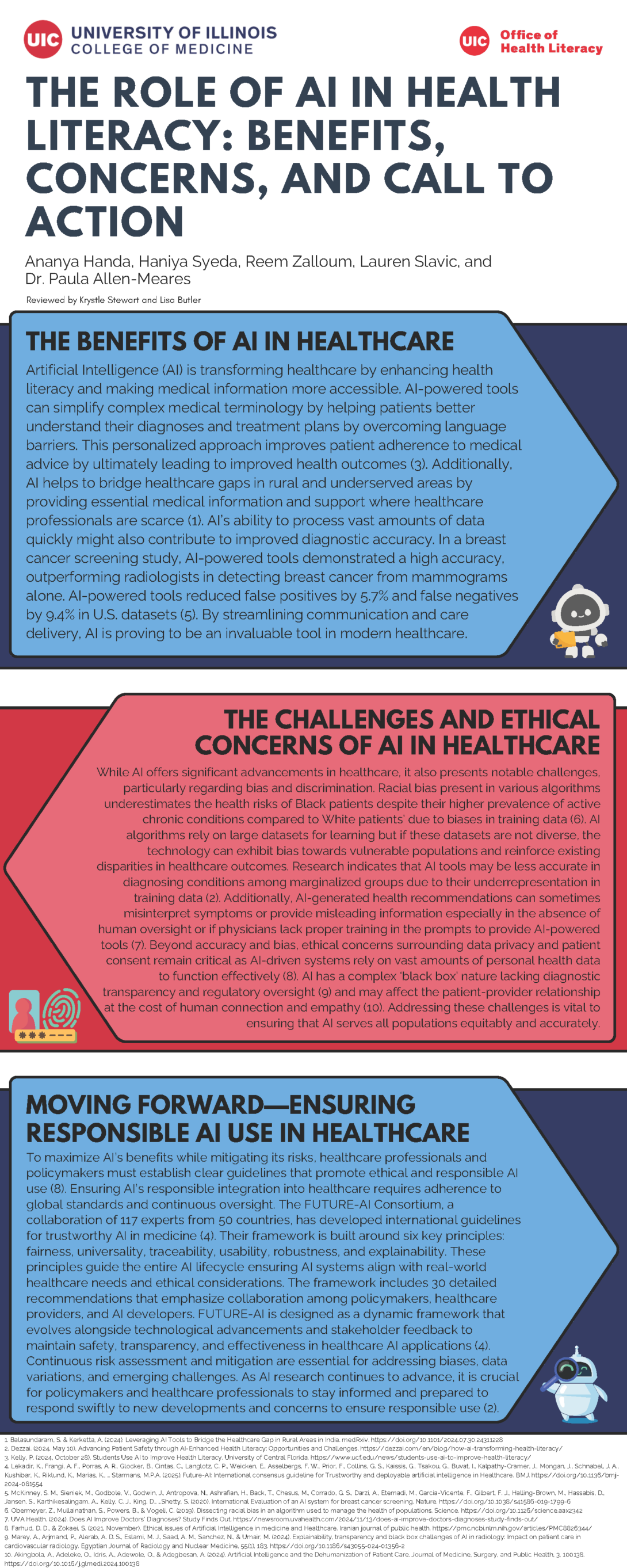The Role of AI in Health Literacy: Benefits, Concerns, and Call to Action
Ananya Handa, Haniya Syeda, Reem Zalloum, Lauren Slavic, and Dr. Paula Allen-Meares
Published April 1st, 2025. Heading link

The Benefits of AI in Healthcare
Artificial Intelligence (AI) is transforming healthcare by enhancing health literacy and making medical information more accessible. AI-powered tools can simplify complex medical terminology by helping patients better understand their diagnoses and treatment plans by overcoming language barriers. This personalized approach improves patient adherence to medical advice by ultimately leading to improved health outcomes (3). Additionally, AI helps to bridge healthcare gaps in rural and underserved areas by providing essential medical information and support where healthcare professionals are scarce (1). AI’s ability to process vast amounts of data quickly might also contribute to improved diagnostic accuracy. In a breast cancer screening study, AI-powered tools demonstrated a high accuracy, outperforming radiologists in detecting breast cancer from mammograms alone. AI-powered tools reduced false positives by 5.7% and false negatives by 9.4% in U.S. datasets (5). By streamlining communication and care delivery, AI is proving to be an invaluable tool in modern healthcare.
The Challenges and Ethical Concerns of AI in Healthcare
While AI offers significant advancements in healthcare, it also presents notable challenges, particularly regarding bias and discrimination. Racial bias present in various algorithms underestimates the health risks of Black patients despite their higher prevalence of active chronic conditions compared to White patients’ due to biases in training data (6). AI algorithms rely on large datasets for learning but if these datasets are not diverse, the technology can exhibit bias towards vulnerable populations and reinforce existing disparities in healthcare outcomes. Research indicates that AI tools may be less accurate in diagnosing conditions among marginalized groups due to their underrepresentation in training data (2). Additionally, AI-generated health recommendations can sometimes misinterpret symptoms or provide misleading information especially in the absence of human oversight or if physicians lack proper training in the prompts to provide AI-powered tools (7). Beyond accuracy and bias, ethical concerns surrounding data privacy and patient consent remain critical as AI-driven systems rely on vast amounts of personal health data to function effectively (8). AI has a complex ‘black box’ nature lacking diagnostic transparency and regulatory oversight (9) and may affect the patient-provider relationship at the cost of human connection and empathy (10). Addressing these challenges is vital to ensuring that AI serves all populations equitably and accurately.
Moving Forward – Ensuring Responsible AI use in Healthcare
To maximize AI’s benefits while mitigating its risks, healthcare professionals and policymakers must establish clear guidelines that promote ethical and responsible AI use (8). Ensuring AI’s responsible integration into healthcare requires adherence to global standards and continuous oversight. The FUTURE-AI Consortium, a collaboration of 117 experts from 50 countries, has developed international guidelines for trustworthy AI in medicine (4). Their framework is built around six key principles: fairness, universality, traceability, usability, robustness, and explainability. These principles guide the entire AI lifecycle ensuring AI systems align with real-world healthcare needs and ethical considerations. The framework includes 30 detailed recommendations that emphasize collaboration among policymakers, healthcare providers, and AI developers. FUTURE-AI is designed as a dynamic framework that evolves alongside technological advancements and stakeholder feedback to maintain safety, transparency, and effectiveness in healthcare AI applications (4). Continuous risk assessment and mitigation are essential for addressing biases, data variations, and emerging challenges. As AI research continues to advance, it is crucial for policymakers and healthcare professionals to stay informed and prepared to respond swiftly to new developments and concerns to ensure responsible use (2).
Published April 1st, 2025.
Footnotes Heading link
- Balasundaram, S. & Kerketta, A. (2024). Leveraging AI Tools to Bridge the Healthcare Gap in Rural Areas in India. medRxiv. https://doi.org/10.1101/2024.07.30.24311228
- Dezzai. (2024, May 10). Advancing Patient Safety through AI-Enhanced Health Literacy: Opportunities and Challenges. https://dezzai.com/en/blog/how-ai-transforming-health-literacy/
- Kelly, P. (2024, October 28). Students Use AI to Improve Health Literacy. University of Central Florida. https://www.ucf.edu/news/students-use-ai-to-improve-health-literacy/
- Lekadir, K., Frangi, A. F., Porras, A. R., Glocker, B., Cintas, C., Langlotz, C. P., Weicken, E., Asselbergs, F. W., Prior, F., Collins, G. S., Kaissis, G., Tsakou, G., Buvat, I., Kalpathy-Cramer, J., Mongan, J., Schnabel, J. A., Kushibar, K., Riklund, K., Marias, K., … Starmans, .P.A. (2025). Future-AI: International consensus guideline for Trustworthy and deployable artificial intelligence in Healthcare. BMJ. https://doi.org/10.1136/bmj-2024-081554
- McKinney, S. M., Sieniek, M., Godbole, V., Godwin, J., Antropova, N., Ashrafian, H., Back, T., Chesus, M., Corrado, G. S., Darzi, A., Etemadi, M., Garcia-Vicente, F., Gilbert, F. J., Halling-Brown, M., Hassabis, D., Jansen, S., Karthikesalingam, A., Kelly, C. J., King, D., …Shetty, S. (2020). International Evaluation of an AI system for breast cancer screening. Nature. https://doi.org/10.1038/s41586-019-1799-6
- Obermeyer, Z., Mullainathan, S., Powers, B., & Vogeli, C. (2019). Dissecting racial bias in an algorithm used to manage the health of populations. Science. https://doi.org/10.1126/science.aax2342
- UVA Health. (2024). Does AI Improve Doctors’ Diagnoses? Study Finds Out. https://newsroom.uvahealth.com/2024/11/13/does-ai-improve-doctors-diagnoses-study-finds-out/
- Farhud, D. D., & Zokaei, S. (2021, November). Ethical issues of Artificial Intelligence in medicine and Healthcare. Iranian journal of public health. https://pmc.ncbi.nlm.nih.gov/articles/PMC8826344/
- Marey, A., Arjmand, P., Alerab, A. D. S., Eslami, M. J., Saad, A. M., Sanchez, N., & Umair, M. (2024). Explainability, transparency and black box challenges of AI in radiology: Impact on patient care in cardiovascular radiology. Egyptian Journal of Radiology and Nuclear Medicine, 55(1), 183. https://doi.org/10.1186/s43055-024-01356-2
- Akingbola, A., Adeleke, O., Idris, A., Adewole, O., & Adegbesan, A. (2024). Artificial Intelligence and the Dehumanization of Patient Care. Journal of Medicine, Surgery, and Public Health, 3, 100138. https://doi.org/10.1016/j.glmedi.2024.100138